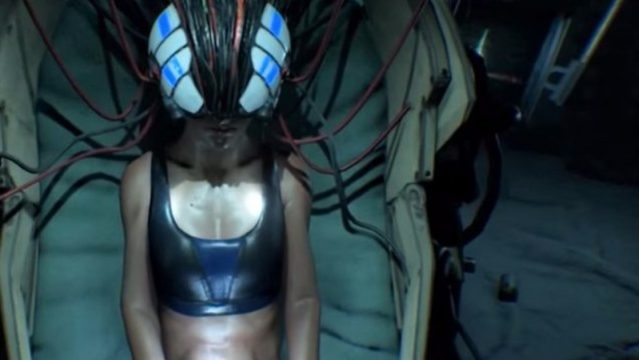Observer takes place in a future Poland where citizens are divided into three different groups: Class A, B, and C. Class A citizens are the top of society, the leaders of the nation and top professionals in their fields and live in luxury. They’re able to afford all the latest in cybernetic technology and the best medical care. In contrast, Class C is made up of the 90% of the nation that sweeps the floors, perform data entry, and they aren’t even allowed in Class A areas.
However, there is one thing all citizens, no matter their differences, are afraid of: the Nanophage. Almost everyone has some cybernetic implant in the future, and with this melding of man and machine, a new disease has arisen.
Cybernetics and nano-machines
In Observer, advanced cybernetics are made possible by the application of nano-machines, microscopic robots that can self-replicate themselves throughout a host’s body. They prevent the rejection of grafted machinery, connect the nerves and tissue of flesh to metal, and generally prevent the issues that arise when putting foreign material in your body.
However, no hardware or software is without glitches. The Nanophage can be transmitted digitally or contracted biologically. It’s caused by a flaw in the nano-machine programming, which causes it to identify its host body as a hostile organism. As the affected nano-machines replicate themselves, the replicas are also affected by the Nanophage, and it soon spreads throughout the body.
How the Nanophage progresses
Early onset symptoms of Nanophage are mild fever and muscle aches that can be confused with the flu. The one way to diagnose it in this stage is to perform a biometric scan, which isn’t typically available to Class C citizens, leading to a majority of outbreaks occurring in their wards.
The phage becomes evident during the “puncture stage” where tiny wounds begin to appear on the afflicted’s body, typically at the point where cybernetics are implanted. As the Nanophage continues the host will experience extreme pain, high fever leading to delirium, and they become biologically contagious.
Eventually, gangrene forms around the cybernetic implants and the nanites make their way to the organs, soon afterward the host will die.
The treatment for Nanophage
Once an individual has acquired Nanophage, there aren’t many viable treatments. Sometimes the healthy nano-machines in a host can react quickly enough to contain the spread of the infected ones, though it’s rare.
There is also a very invasive last resort in which doctors try to activate the nanite’s mass recall function to get them to return to the juncture between the patient’s cybernetic implants merge with their flesh. They then excise the implants. This typically causes extreme pain, nerve damage, and if a neural implant is removed, mild-to-severe brain damage.
Why the apartment dwellers are so apprehensive
The lockdown you experience while playing Observer has the inhabitants of the tenement house so nervous because the protocol for dealing with a Nanophage outbreak starts by completely locking down a building and cutting its communication lines.
Although it’s not a confirmed fact, rumor has it that after a Nanophage lockdown, special teams called “Cleaners” would take those infected for scientific study, and kill the rest. One of the reasons so many are apprehensive towards Lazarski is because they think he’s the harbinger of the coming Cleaners.







